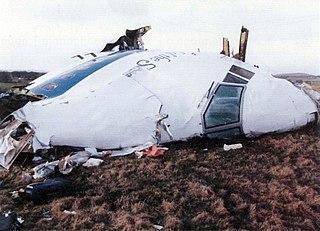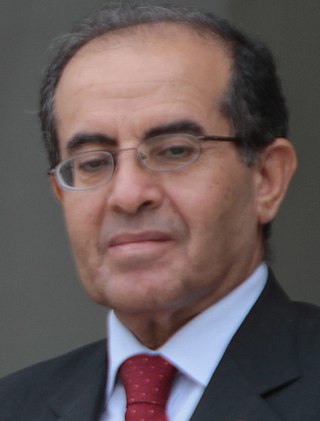Related Research Articles

Libya's history involves its rich mix of ethnic groups, including the indigenous Berbers/Amazigh people. Amazigh have been present throughout the entire history of the country. For most of its history, Libya has been subjected to varying degrees of foreign control, from Europe, Asia, and Africa.

Libya, officially the State of Libya, is a country in the Maghreb region of North Africa. Libya borders the Mediterranean Sea to the north, Egypt to the east, Sudan to the southeast, Chad to the south, Niger to the southwest, Algeria to the west, and Tunisia to the northwest. Libya comprises three historical regions: Tripolitania, Fezzan, and Cyrenaica. With an area of almost 1.8 million km2 (700,000 sq mi), it is the fourth-largest country in Africa and the Arab world, and the 16th-largest in the world. Libya claims 32,000 square kilometers of southeastern Algeria, south of the Libyan town of Ghat. The country's official religion is Islam, with 96.6% of the Libyan population being Sunni Muslims. The official language of Libya is Arabic, with vernacular Libyan Arabic being spoken most widely. The majority of Libya's population is Arab. The largest city and capital, Tripoli, is located in northwestern Libya and contains over a million of Libya's seven million people.

Muammar Muhammad Abu Minyar al-Gaddafi was a Libyan revolutionary, politician and political theorist who ruled Libya from 1969 until his killing in 2011 by rebel forces. He first served as Revolutionary Chairman of the Libyan Arab Republic from 1969 to 1977 and then as the Brotherly Leader of the Great Socialist People's Libyan Arab Jamahiriya from 1977 to 2011. Initially ideologically committed to Arab nationalism and Arab socialism, Gaddafi later ruled according to his own Third International Theory.

Benghazi is the second-most-populous city in Libya as well as the largest city in Cyrenaica, with an estimated population of 1,207,250 in 2020. Located on the Gulf of Sidra in the Mediterranean, Benghazi is also a major seaport.

The Libya national football team represents Libya in men's international association football and it is controlled by the Libyan Football Federation. The team has never qualified for FIFA World Cup but has qualified for editions of Africa Cup of Nation in 1982, 2006, and 2012. In 1982, the team was both the host and runner-up. In the Arab Cup, Libya finished second in 1964 and 2012, and third in 1966. The team is affiliated with both FIFA and Confederation of African Football (CAF).

Saif al-Islam Muammar al-Gaddafi is a Libyan political figure. He is the second son of the late Libyan leader Muammar Gaddafi and his second wife Safia Farkash. He was a part of his father's inner circle, performing public relations and diplomatic roles on his behalf. He publicly turned down his father's offer of the country's second highest post and held no official government position. According to United States Department of State officials in Tripoli, during his father's reign, he was the second most widely recognized person in Libya, being at times the de facto prime minister, and was mentioned as a possible successor, though he rejected this. An arrest warrant was issued for him on 27 June 2011 by the International Criminal Court (ICC) for charges of crimes against humanity against the Libyan people, for killing and persecuting civilians, under Articles 7(1)(a) and 7(1)(h) of the Rome statute. He denied the charges.

Muammar Gaddafi became the de facto leader of Libya on 1 September 1969 after leading a group of young Libyan Army officers against King Idris I in a bloodless coup d'état. After the king had fled the country, the Revolutionary Command Council (RCC) headed by Gaddafi abolished the monarchy and the old constitution and established the Libyan Arab Republic, with the motto "freedom, socialism and unity". The name of Libya was changed several times during Gaddafi's tenure as leader. From 1969 to 1977, the name was the Libyan Arab Republic. In 1977, the name was changed to Socialist People's Libyan Arab Jamahiriya. Jamahiriya was a term coined by Gaddafi, usually translated as "state of the masses". The country was renamed again in 1986 as the Great Socialist People's Libyan Arab Jamahiriya, after the United States bombing that year.

Pan Am Flight 103 (PA103/PAA103) was a regularly scheduled Pan Am transatlantic flight from Frankfurt to Detroit via a stopover in London and another in New York City. The transatlantic leg of the route was operated by Clipper Maid of the Seas, a Boeing 747 registered N739PA. Shortly after 19:00 on 21 December 1988, while the aircraft was in flight over the Scottish town of Lockerbie, it was destroyed by a bomb, killing all 243 passengers and 16 crew in what became known as the Lockerbie bombing. Large sections of the aircraft crashed in a residential street in Lockerbie, killing 11 residents. With a total of 270 fatalities, it is the deadliest terrorist attack in the history of the United Kingdom.

Sirte, also spelled Sirt, Surt, Sert or Syrte, is a city in Libya. It is located south of the Gulf of Sirte, between Tripoli and Benghazi. It is famously known for its battles, ethnic groups, and loyalty to Muammar Gaddafi. Due to developments in the First Libyan Civil War, it was briefly the capital of Libya as Tripoli's successor after the Fall of Tripoli from 1 September to 20 October 2011. The settlement was established in the early 20th century by the Italians, at the site of a 19th-century fortress built by the Ottomans. It grew into a city after World War II.

The Libyan civil war or the 2011 Libyan revolution, also known as the First Libyan Civil War was an armed conflict in 2011 in the North African country of Libya that was fought between forces loyal to Colonel Muammar Gaddafi and rebel groups that were seeking to oust his government. The war was preceded by protests in Zawiya on 8 August 2009 and finally ignited by protests in Benghazi beginning on Tuesday, 15 February 2011, which led to clashes with security forces who fired on the crowd. The protests escalated into a rebellion that spread across the country, with the forces opposing Gaddafi establishing an interim governing body, the National Transitional Council.

The anti-Gaddafi forces, also known as the Libyan opposition or Libyan rebels, were Libyan groups that opposed and militarily defeated the government of Muammar Gaddafi during the First Libyan Civil War in 2011, killing him in the process. The Anti-Gaddafi forces were represented by the National Transitional Council and their National Liberation Army, which claimed to be the "only legitimate body representing the people of Libya and the Libyan state". These opposition forces included organized and armed militia groups, participants in the Libyan Civil War, Libyan diplomats who switched their allegiance from the Gaddafi-led government, and Libyan military units that switched sides to support the protesters.

The National Transitional Council (NTC) was a transitional government established in the 2011 Libyan civil war. The rebel forces overthrew the Libyan Arab Jamahiriya of Muammar Gaddafi. The NTC governed Libya for a period of ten months after the end of the war, holding elections to a General National Congress on 7 July 2012, and handing power to the newly elected assembly on 8 August.

The National Liberation Army, officially the National Liberation Armed Forces of the Free Libyan Republic, formerly known as the Free Libyan Army, was a Libyan military organisation affiliated with the National Transitional Council, which was constituted during the First Libyan Civil War by defected military members and civilian volunteers, in order to engage in battle against both remaining members of the Libyan Armed Forces and paramilitia loyal to the rule of Muammar Gaddafi. Its self proclaimed chief commander was General Khalifa Haftar, although the National Transitional Council preferred to appoint Major General Abdul Fatah Younes Al-Obeidi as its commander-in-chief. It had prepared for some time in portions of Eastern Libya controlled by the anti-Gaddafi forces for eventual full-on combat in Western Libya against pro-Gaddafi militants, training many men before beginning to go on the offensive. They have battled for control of Benghazi, Misrata, Brega, Ajdabiya, Zawiya and Ra's Lanuf as well as several towns in the Nafusa Mountains. They finally began the Battle for Tripoli in August 2011 when they attacked from the west of the city, as well as fomenting an internal uprising on 20 August.

On 19 March 2011, a multi-state NATO-led coalition began a military intervention in Libya to implement United Nations Security Council Resolution 1973, in response to events during the First Libyan Civil War. With ten votes in favour and five abstentions, the intent of the UN Security Council was to have "an immediate ceasefire in Libya, including an end to the current attacks against civilians, which it said might constitute 'crimes against humanity' ... [imposing] a ban on all flights in the country's airspace — a no-fly zone — and tightened sanctions on the Muammar Gaddafi regime and its supporters."

Mahmoud Jibril el-Warfally, also transcribed Jabril or Jebril or Gebril, was a Libyan politician who served as the interim Prime Minister of Libya for seven and a half months during the overthrow of Muammar Gaddafi and the Libyan Civil War, chairing the executive board of the National Transitional Council (NTC) from 5 March to 23 October 2011. He also served as the Head of International Affairs. As of July 2012, Jibril was the head of one of the largest political parties in Libya, the National Forces Alliance.

The foreign relations of Libya were largely reset at the end of the Libyan Civil War, with the overthrow of Muammar Gaddafi and the Second Libyan Civil War. The current Minister of Foreign Affairs since 15 March 2021 is Najla Mangoush. Although many foreign embassies in Tripoli closed down in 2014 due to the fighting, by the end of 2017 thirty diplomatic missions were reopened in the Libyan capital.

The killing of Muammar Gaddafi took place on 20 October 2011 after the Battle of Sirte. Muammar Gaddafi, the deposed leader of Libya, was found west of Sirte after his convoys were attacked by NATO aircraft, as part of the 2011 NATO military intervention in Libya. He was then captured by National Transitional Council (NTC) forces and killed shortly afterwards.
The international reactions to the killing of Muammar Gaddafi concern the responses of foreign governments and supranational organisations to the killing of former Libyan leader Muammar Gaddafi at the Battle of Sirte, the last major engagement of the 2011 Libyan civil war, on 20 October 2011.

The Libyan Crisis is the current humanitarian crisis and political-military instability occurring in Libya, beginning with the Arab Spring protests of 2011, which led to two civil wars, foreign military intervention, and the ousting and death of Muammar Gaddafi. The first civil war's aftermath and proliferation of armed groups led to violence and instability across the country, which erupted into renewed civil war in 2014. The second war lasted until October 23, 2020, when all parties agreed to a permanent ceasefire and negotiations.
References
- ↑ Kareem Fahim (22 October 2011). "In his last days, Gadhafi survived on pasta and delusions". Star Tribune. Retrieved 23 October 2011.